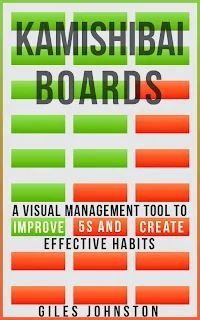 |
| Available to purchase here. |
As simple as you could want it, a Kamishibai board is a T-card system that has red cards glued to green
cards (so that each T-card has a red side and a green side). The red cards are for the incomplete tasks, where as the green cards symbolise that the work has been done. See the photo below of a board in use.
cards (so that each T-card has a red side and a green side). The red cards are for the incomplete tasks, where as the green cards symbolise that the work has been done. See the photo below of a board in use.
On the red side of the card you write the name of the task that needs to be completed, and if appropriate you can include details of how the task is to be completed. This is not expected to replace standard operating procedures, but can be a good opportunity for an aide memoire.
The boards can be organised for daily, weekly and even monthly cycles. They are great as part of a 5S implementation (the Sustain phase), help to establish habits that support ISO9001 quality management systems and really help bolster any lean initiatives taking place. The key is to finding a routine that works well for you, a simply laid out board and a good position in the office or factory where people will walk past it.
 |
| A Kamishibai board in use, saving material and downtime costs. |
So a Kamishibai board is a simple tool that can be used to great effect to create habits and drive behaviour.
They are low cost and quick to implement. If you are looking for more ideas around this concept you can view our Trade Cutting Formes case study, or our Slimming Solutions case study.
Giles
P.S. If you want to learn how to quickly implement a Kamishibai Board into your business then check out my Kindle book - available here.
About the author
Giles Johnston is a Chartered Engineer who specialises in helping businesses to grow and improve through better business processes.
Giles is also the author of Business Process Re-Engineering and creator of the 'Making It Happen' continuous improvement strategies course.